It has taken some time to get here, but Superpedestrian appears to be rolling ahead at full speed with their latest iteration of the all-in-one smart electric bike wheel called the Copenhagen Wheel! Dating back to 2011, this concept has been internationally praised and excitedly backed by individuals who put down deposits through crowd-funding websites like Kickstarter. Initially, it sounds like some backers were waiting over a year to get their wheels, but the company has caught up and now it’s fully available. So, whether you buy this as a stand-alone ebike conversion kit for your favorite existing bike (with 26″ or 28″ 700c sized wheels), or choose from one of the many pre-converted frames available from partner companies like Fyxation, Marin or Public, you’re going to get simplicity, intelligence, and fun. This thing is a lot cleaner than most of the other hub motor kits I have tested and reviewed in recent years, in large part because it’s completely wireless. It relies on Bluetooth and requires a smart phone to operate (iOS or Android). It will fit 135 mm or 120 mm rear dropout spacing (for single speed, 7 to 9 speed cassettes, or fixies), and I was told that in late 2018 or early 2019 they plan on supporting disc brakes! This is one of the big trade-offs with current gen Copenhagen wheels which only support rim brakes. The demo bike shown in the video review above only had a front rim brake and we relied on the regenerative braking feature to slow the rear wheel… which worked surprisingly well. My favorite parts of this system are how sleek it looks, the attention to detail in design and manufacturing of the hardware and the app, and how quiet but fluid it feels to ride. Some of my gripes include the overall weight of the system and that it’s rear-heavy vs. spread out across the frame, that the battery capacity is much lower than average (279 watt hours vs. 500+ wh on many new products), that it only comes in one color, and that the app must be open to change assist levels (and would slowly drain your battery and possibly create a large bright visual distraction in low lighting conditions). Like so many of the best products out there, this thing focuses in vs. on a few use cases vs. trying to do everything. And I must say, for city riding applications, it does very well.
The only thing I really know about the motor inside this hub is that it’s a gearless direct drive type, rated at 350 watts. That’s about average power in the world of e-bikes, but more companies are moving to 500 or even 750 watts for hub motors to make them better at climbing, accelerating, and being marketed. Those larger motors weigh more and drain the battery quicker… and some of them are physically larger as well, but the extra stat’s don’t mean a lot when you’re cruising on efficient tires through a moderately level city environment. Keep in mind, most cyclists stay below 200 watts when pedaling, so 350 watts nominal is still quite capable. This is a pedal-assist type of motor that requires human input to run, but I was impressed by how smart it was. I didn’t always have to push hard to get it moving. It sensed when I was pedaling lightly and still provided some help (especially in the highest level of assist). I compared the Copenhagen Wheel to the BionX D-Series in the video review because their cases have a similar wide look. The D-Series however, is just a big motor and their battery pack, controller, and display are all separate. Within a similar hub casing space, Superpedestrian has included batteries, a controller, sensor units, and a charging interface, but they rely on your smartphone for the display. I questioned heat dissipation in the conversation we had on camera, but I have no reason to think that it would have issues, despite acting as a generator in regen mode. Extreme heat and cold can impact performance of and degrade Lithium-ion batteries so one thought I had was about storage. Even if the motor stays relatively cool when in use, it may be subject to more extreme conditions if you cannot bring the entire bike inside. Perhaps the complexity of this all-inclusive design, making sure it was durable, is part of why it has taken Superpedestrian a bit longer to deliver a finished product to market? What I can say about the Copenhagen Wheel is that the power output feels very satisfying and zippy. It does surge a bit at low speeds because power output seems closely linked to pedal torque signal once cadence is registered. That is, you feel the motor kick in hard on a forceful downstroke and then ease out between strokes for the first few strokes. The benefit to this higher sensitivity is that the motor stops pushing you almost instantly when you stop pedaling and never feels out of control… it’s a more empowering drive system vs. one that feels like a scooter or on/off with delay. So many cheaper pedal assist systems measure one or two signals and do so with less frequency. Superpedestrian measures four signals more than 100 times per second and does deliver the experience of being a “super-pedestrian” or maybe a “super-cyclist” who is getting a response relative to their pedal actions. Eventually, when you do start slowing down and eventually stop pedaling altogether, there’s an opportunity to recapture energy by pedaling backwards to initiate regeneration with the motor. This is one of the neatest parts of the Copenhagen wheel to me, that pedaling backwards (even slowly), results in smooth deceleration that’s hands-free. A similar experience can be achieved by navigating down from one of the three assist levels into Exercise mode (simulating climbing a hill) or activate the bike lock through the app. Someone could still pick the bike up and carry it away, but riding becomes much more difficult in this locked mode and you receive a notification on your phone about the bike possibly being stolen, so you can check in on the situation. Once the wheel is stolen, it would be difficult to re-configure and re-connect to the wheel so much like smartphones, it’s not a great theft target. As a final thought, gearless motors are known for being durable because there aren’t gears rubbing together to create power from a gearbox but they do suffer from a bit of magnetic drag when coasting (called cogging) and they do weigh more because they require more magnetic material and copper winding inside.
Powering the bike is a slightly improved Lithium-ion battery pack that should provide 15 to 30 miles of range per charge, depending on which level of assist you choose and environmental factors. It’s not a long-distance solution and there does not appear to be a way to expand the capacity or even remove the battery for off-bike charging like a lot of systems that are coming out today, but it’s compact and still quite capable. Lithium-ion batteries have become the standard for e-bikes in recent years because price has gone down and this technology is lightweight and long-lasting. That is, it can endure over 1,000 full charge cycles before the capacity drops significantly. I mentioned that extreme heat and cold can play a role in the lifespan and even day to day use of these cells, and that storage is one consideration that would impact this. Given how clean and compact the Copenhagen Wheel is, and that many riders may already keep their bikes inside apartments in the city, perhaps this is not an issue? I thought about how quick and easy it might be to remove the entire rear wheel for storage, but remembered that the integrated torque arm adds to this complexity, and should be considered when it comes to rear-wheel maintenance. Most people who cycle regularly will advice that you check your tire pressure regularly to avoid dropping too low and getting a “pinch flat” where the rim cuts into the inner-tube when traveling over rough terrain. That’s a great consideration here, again because of the extra steps to remove the wheel. But to be fair, it’s not that much different from a lot of hub motors that have cables running to them… on those systems, you have an extra cable to disconnect and here, you have a torque arm. The included charger offers a standard 2 Amp output, which is fine for the modest capacity here, and has a fancy magnetic connector point that won’t get bent or pull the bike over if snagged. I love the four-LED charge indicator on the side of the wheel near the charging port, the power switch, and the cover device that protects the charging port. It’s all right there, compact and clean, but it does require that you lean down to interact and this is another interaction that makes me think of younger riders who live in the city. Being comfortable with a bit of extra weight to bring the bike inside, bending over to turn it on, dealing with limited brake options etc.
Operating the Copenhagen Wheel is simple once everything is setup, but it’s a system that requires a bit more up front work. You need to install the wheel, charge it, lean over and turn it on, then make sure the app has been downloaded to your phone, that you have paired the wheel over Bluetooth, and that your personal information has all been entered into the app. Now, you are ready to go. From this point, it’s pretty simple and satisfying to use. The main screen shows your assist level in the center (allowing you to swipe up or down to change) and your battery percentage on the left. I LOVE that they went with a big infographic and percentage for the battery considering that the capacity is a bit lower than on other ebikes. Even though the current lot of pre-made bikes seem to be efficient, the extra 16.8 lbs of weight here and the cogging factor wouldn’t make it super fun to pedal the Copenhagen Wheel up a hill or for long distances. It’s the curse of any electric bike, that the weight added for motor support can become a weight challenge if you run out of juice… Consider bringing the 1.7 lb charger in your backpack? Keep an eye on the battery level and swipe down for less assistance if you are running low and use the backwards-pedaling regen feature as much as possible. But be safe! And note that regen seems to deliver a very small percentage of actual refill potential. You’ll burn way more energy on calories trying to charge the bike on exercise mode than you would by simply plugging it in. But, you will get exercise! Yes, the app is neat, but it does add to the cost of owning this bike in that you need a compatible smartphone. Most people have one, it’s not a huge deal, but you will drain the battery on your phone if you leave the app open while riding around and it could get distracting at night with a big bright screen facing you. Yes, you can close your phone, but then you cannot change assist levels or see the battery readout. It’s a bit of a compromise, and there’s no way to charge your phone off of the e-bike battery because there are no wires running along the bike. This is one area where I’d consider getting creative with a case+battery for your phone or a portable energy bank. Like so many products, when you try to get super clean and simple, you end up making trade-offs. The optimal use for this bike system in my mind is for under 20 mile rides through the city with a more fit and active rider. This is when it becomes fun and empowering, it helps with hills when you need it, gives you a “tail wind” feel, and won’t become a drag because you’re really not going too far… and your phone won’t run out of juice either ;)
I’m told that one other update coming in late 2018 or early 2019, in addition to disc brake compatibility, is an 11-gear option. For now, you get 1-10 gears and rim brake support. I test rode a single speed bike because it keeps the chain tight and simple, it won’t fall off and the bike is lighter because there’s only one rear cog and no derailleur or shifter. In so many ways, the single speed option is best, because you get support from the motor to make up for a lack of gears. You can configure a bike like this to weigh in the mid 40 lbs (or less depending on the frame) which is lower than the average electric bike. Yes, it’s a bit rear heavy and you’re stuck with red unless you feel like getting creative with spray paint. In a lot of ways, this seems like the same Copenhagen Wheel that I have seen and been excited about before… but the app is always getting better and their hardware seems really solid and durable. I welcome feedback from newer customers, people who have bought the late 2017 model or through 2018. It would be neat to hear from someone who has had an earlier version and now upgraded to the latest and greatest. As someone who only has space for one electric bike in my apartment, this could be a great option for keeping an old favorite bicycle frame but breathing some new fun into the daily commute routine. Perhaps the biggest consideration then is range. Is there a spot to charge at work? The battery cannot come in, the wheel is not easy to remove, and leaving your fancy charger out near a public rack (perhaps in a parking garage) might not feel that safe. I would love to see a removable battery from Superpedestrian someday, or some other way to extend this product so people who have further commutes, or need to pickup groceries after work will not be stuck pedaling part way unassisted… and worse, fighting the additional weight and slight drag produced by the gearless motor. And please also chime in about the app locking feature, we found that it did not lock initially and that we had to turn off auto-pairing and even close the app… so perhaps that’s a software update or we had something mixed up. Big thanks to Superpedestrian for partnering with me on this post, coordinating the opportunity to see a converted bike at Propel Bikes in New York City and providing some insights into future improvements and features. It’s rare to get that from companies because they do not want to cannibalize current sales, but I think it makes sense here because many compatible bikes are not using disc brakes and 10 speeds vs. 11 speeds isn’t a huge deal in many cases.
Pros:
- You can set the top speed as low as 10 mph and as high as 25 mph with one mile increments in between, this is great for people who have kids and want to limit their speed for safety or maybe just want to help extend range… in my experience, anything over 20 mph starts to see a big hit due to air resistance
- You can set the power save timeout at one minute or up to 30 minutes, which is good because the gyroscope seems to be active and pulsing the motor power of the bike when it’s on and this could slowly sap the power
- I like that they offer a range of wheel size choices, gearing options (which should include 11 speeds in late 2018), and even bikes now! You don’t have to build this yourself or get help from a shop, you can simply choose one of their bikes and they are all reasonably priced
- Unlike many electric bicycle systems in this price range, the Copenhagen Wheel is constantly getting better because it receives over-the-air software updates and new app releases, it also has localized support depending on what country you live in
- The charging interface uses a standardized magnetic clasp called Rosenberger which pops out easily if tripped over by accident, vs. bending or tipping the bike, it costs more but works pretty well (just avoid getting the plug end dirty or it can pick up metal filings and debris from garage floors
- I really like the app that Superpedestrian designed, it’s clear and simple when riding but provides LOTS of supporting information and stats about how and where you traveled in the sub menus and even includes a profile system to make it more personal and relevant, and easy to share
- The wheel seems pretty well made, both the hub and spoke integration but also the rim which has reinforcement eyelets to improve strength
- Even though the price hasn’t risen, you now get a slightly higher battery capacity with the Copenhagen Wheel, it’s rated at 5.8 amp hours vs. just 5.5 and still runs at 48 volts for increased efficiency and peak power
- The unique backward-pedal system, to activate regenerative braking, is so fun to use and made me miss it when I switched back to traditional bikes, it’s so cool to slow down using this approach vs. your hands and will limit wear on your brake pads over the long run while slowly re-charging the battery
- The motor controller is very responsive, it provides power when you push and eases back when you release, there’s a bit of surge feeling at first (when making those first few pedal strokes) but quickly smooths out and just seems smarter and more active than a lot of sensors I have tested on other electric bikes and kits
- The Copenhagen Wheel comes with a torque arm that connects to the left chain stay to spread force into the frame vs. the dropout, it’s a thoughtful and sturdy design, a nice little attention to detail
- Gearless motors are known for being very durable and quiet, I can attest to how quiet the Copenhagen Wheel is and was impressed with the torque and zippy feel despite being so quiet
- Customer support seems to be very good at the company now, they have built out the website and hired a team who are engaged to answer questions and provide support, they now offer a one year comprehensive warranty
- Even though the Copenhagen Wheel is mostly sold direct, it appears that the company is now working with dealers as well, so it’s easier to take a test ride, get the wheel installed on your bike, and get post-purchase support
Cons:
- The current wheel system is not compatible with a rear disc brake setup (late 2018 that is planned for release), at present you have to use rim brakes but at least the system does offer some regenerative braking, you backpedal to activate this
- Only works with specific wheel size options including 26″ and 700c 28″ but not 20″, 24″, or fat bike which limits some of the possible use cases for the wheel, at least they provide several choices for different tire sizes with rim widths in addition to the two 26″ and 28″ diameters
- Let’s hope you are okay with glossy red, because at this time, Superpedestrian only offers their wheel in one color, it seems like a branding decision, which makes sense, and they do let you choose the rim color (silver or black) but I might add a few stickers or even consider spray painting this product to better match my bike
- It’s awesome that everything is contained in this one wheel, there are no wires running across the frame or extra things to setup but it also makes the bike rear heavy and might shake the batteries more than competing products that are frame mounted, the shorter spokes may not provide as much flex in the rear wheel which also makes it feel a bit stiffer
- You must own a smartphone with iOS or Android in order to operate the Copenhagen Wheel vs. many other systems that have a stand-alone display panel and control pad, and there’s no way to physically connect your phone to any sort of charger that draws from the rechargeable e-bike battery
- As with most of the direct-drive gearless hub motor ebikes I have tested and reviewed, there is some cogging drag which occurs because of the magnets repelling the stater inside the wheel, this adds a bit of work when pedaling unassisted or when coasting but also generates a small amount of electricity that goes back into the battery
- The phone display has a battery percentage readout and realtime power charts (showing your power and how much power the motor is putting out) which is all great but the background is white and could be very bright and distracting at night, we were able to turn down the phone brightness but I think a night mode would be cool… maybe that’s already built in or coming with a software update
Resources:
- Official Site: https://superpedestrian.com
- More Pictures: https://photos.app.goo.gl/a4UmsxTO1f2LJcx03

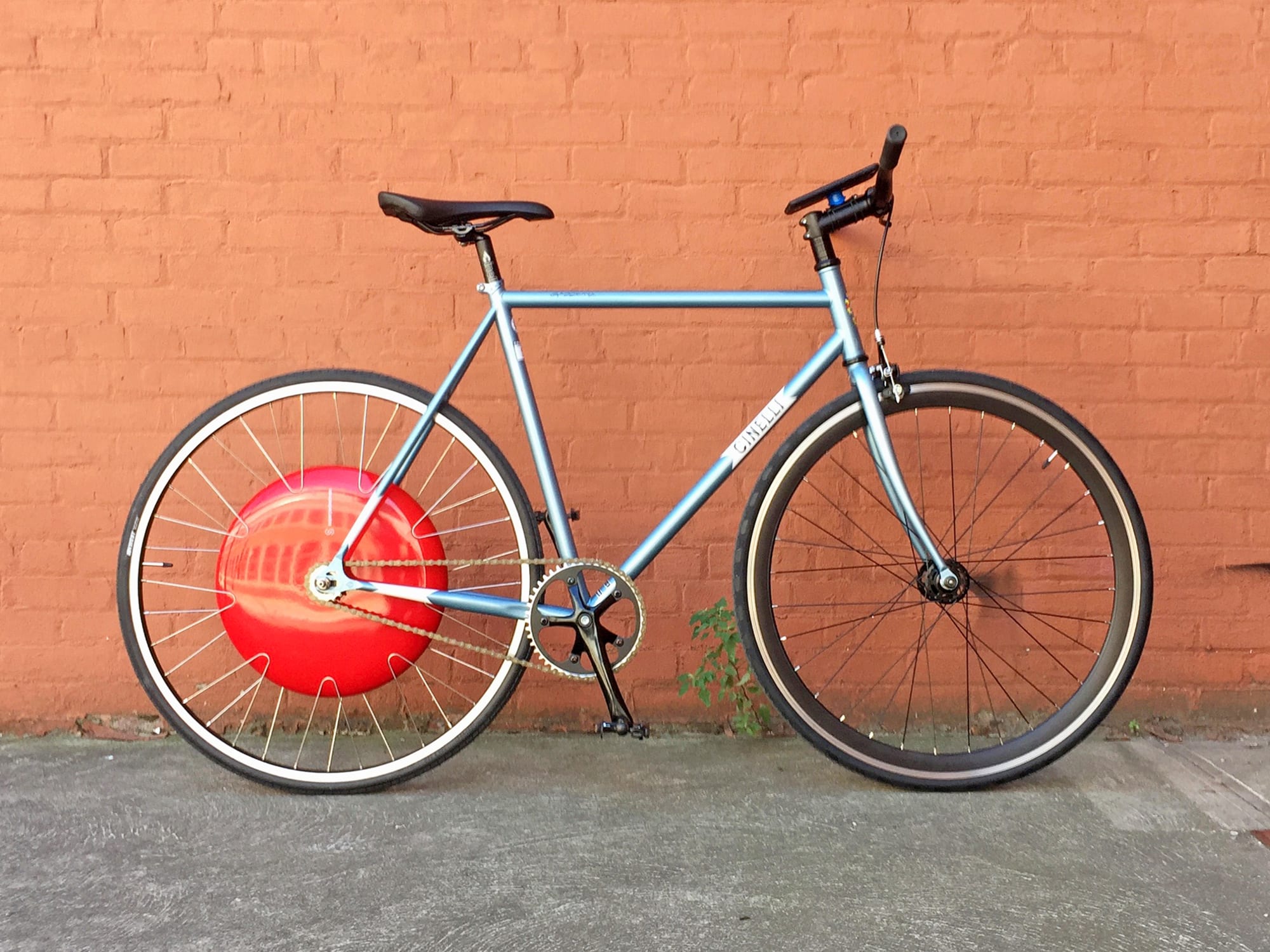
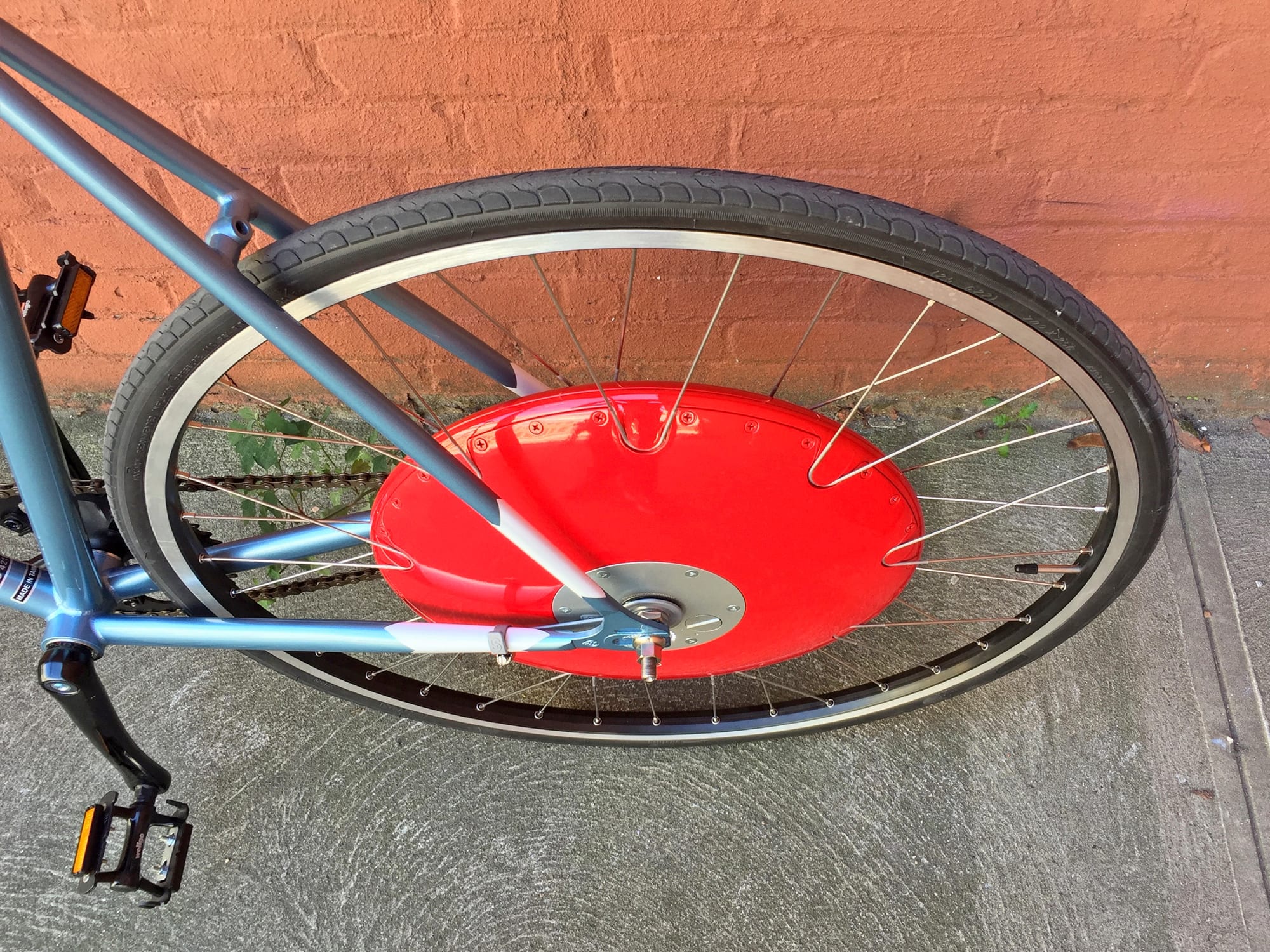
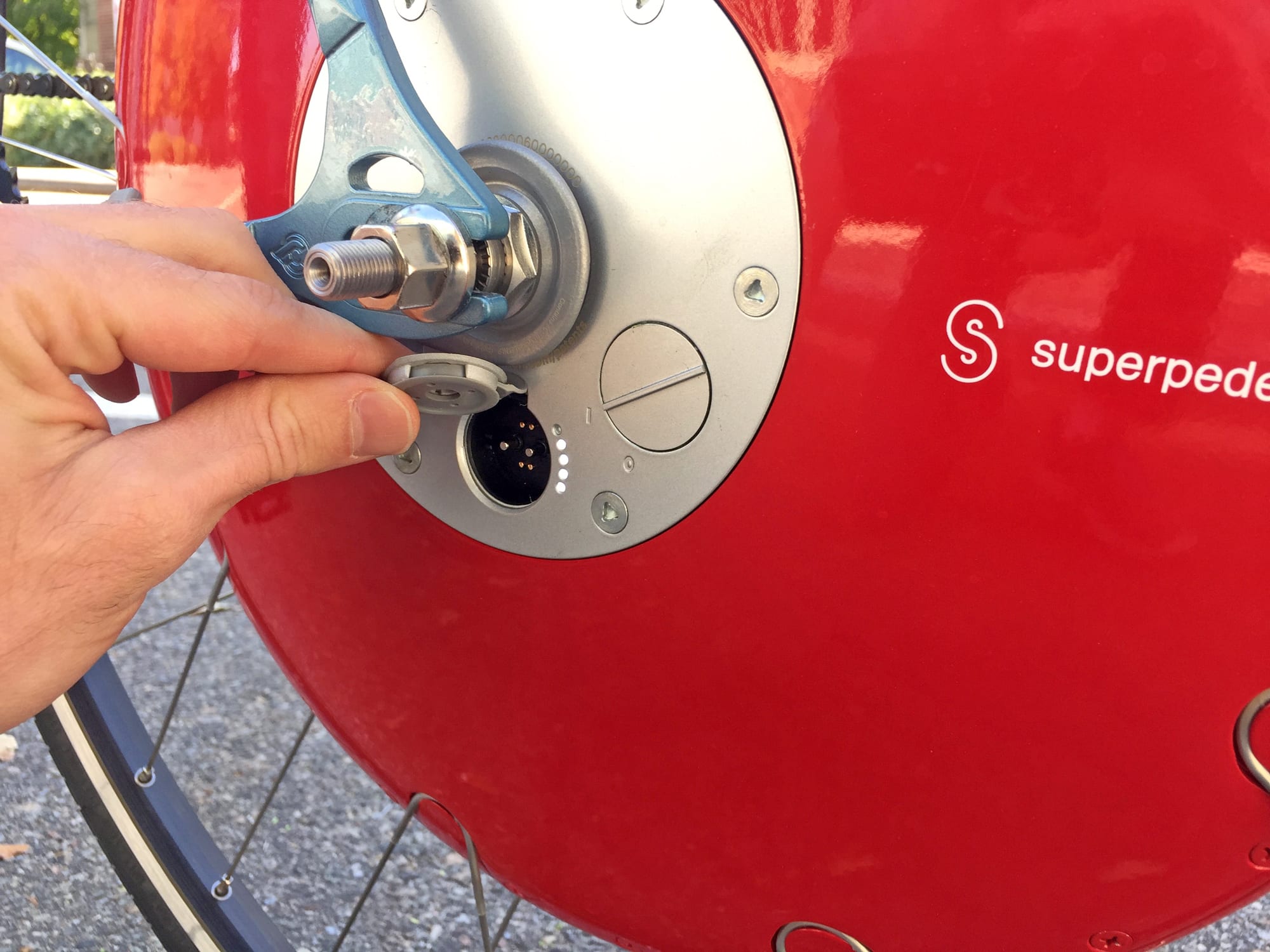
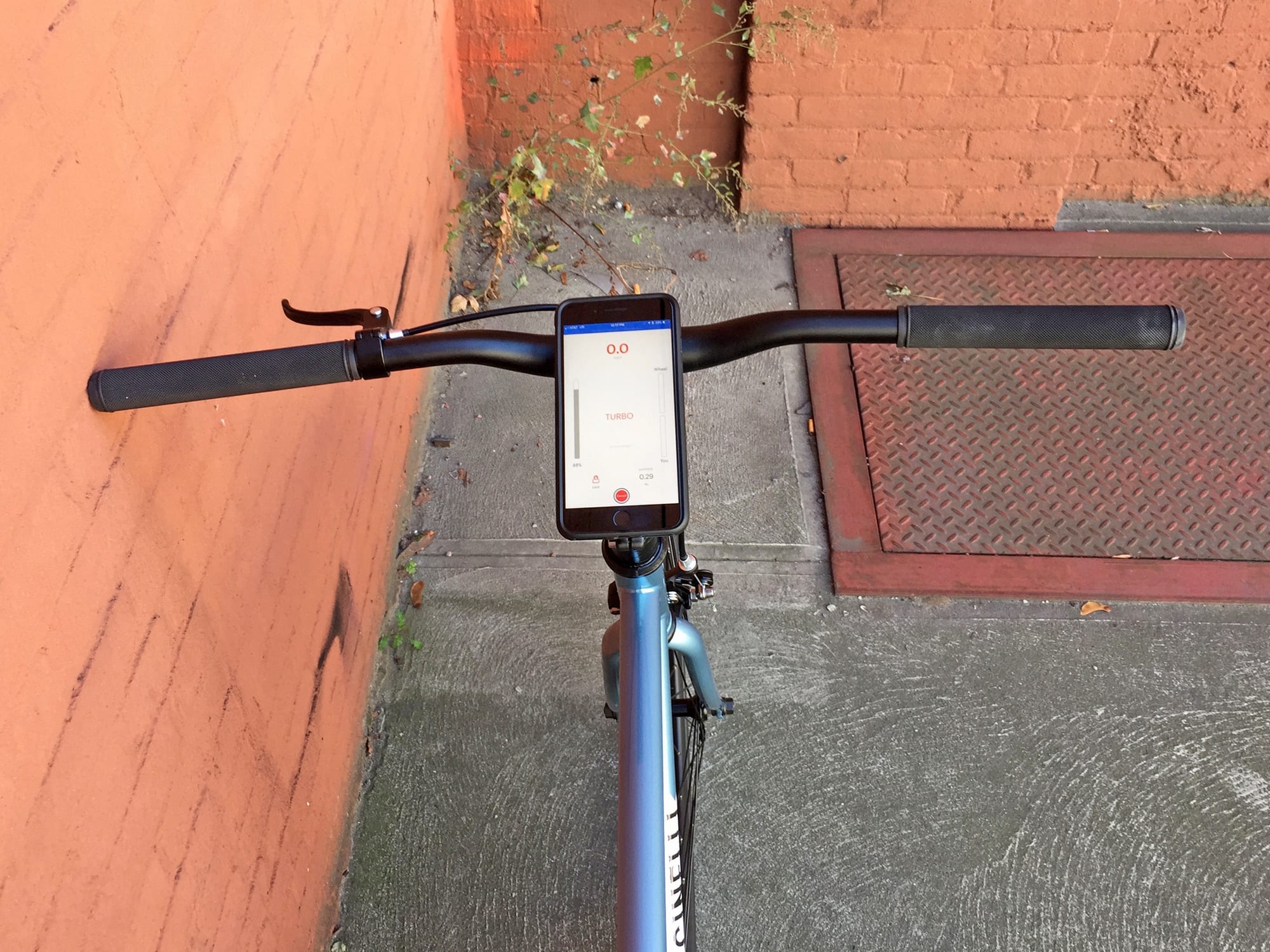
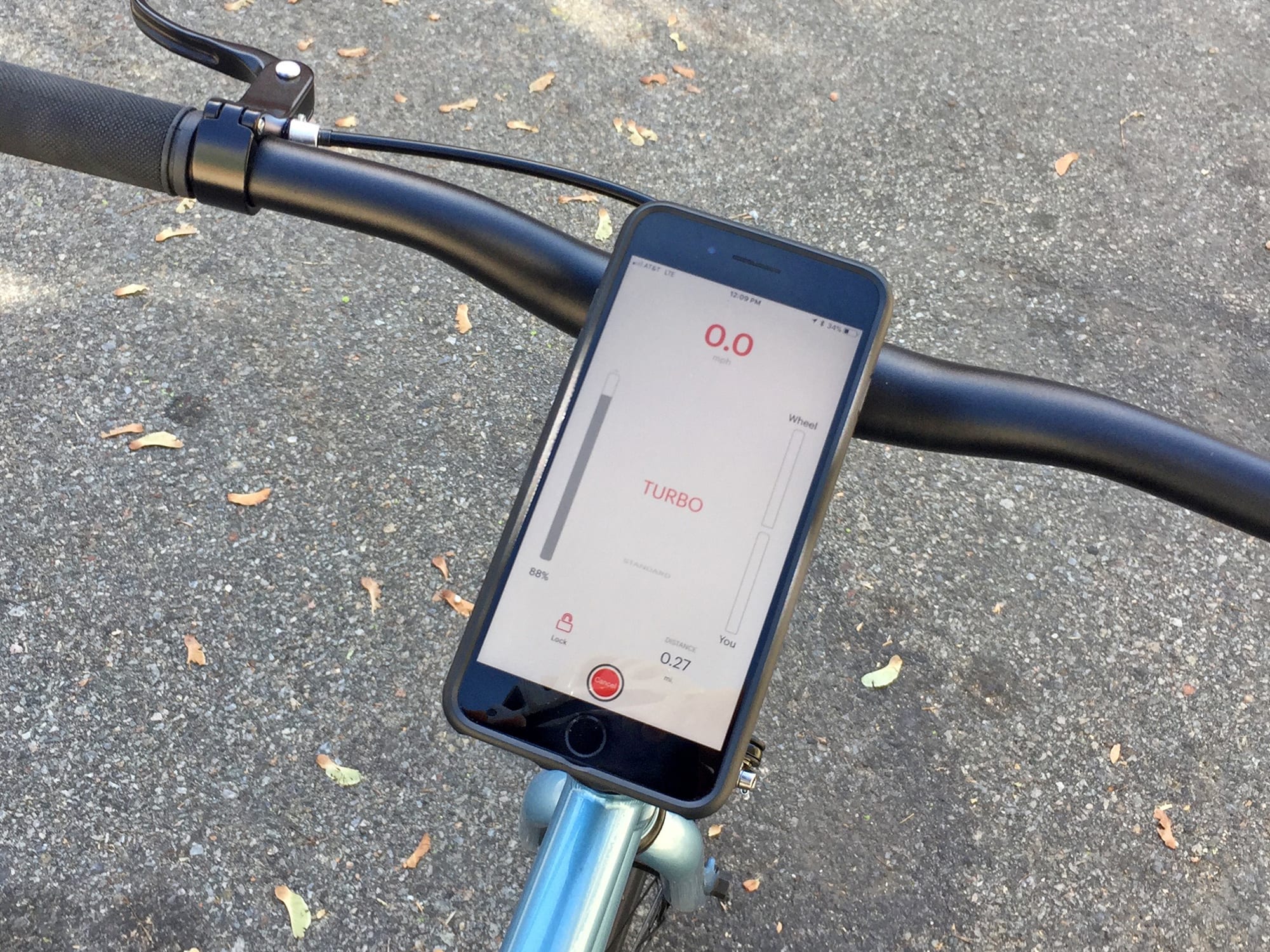

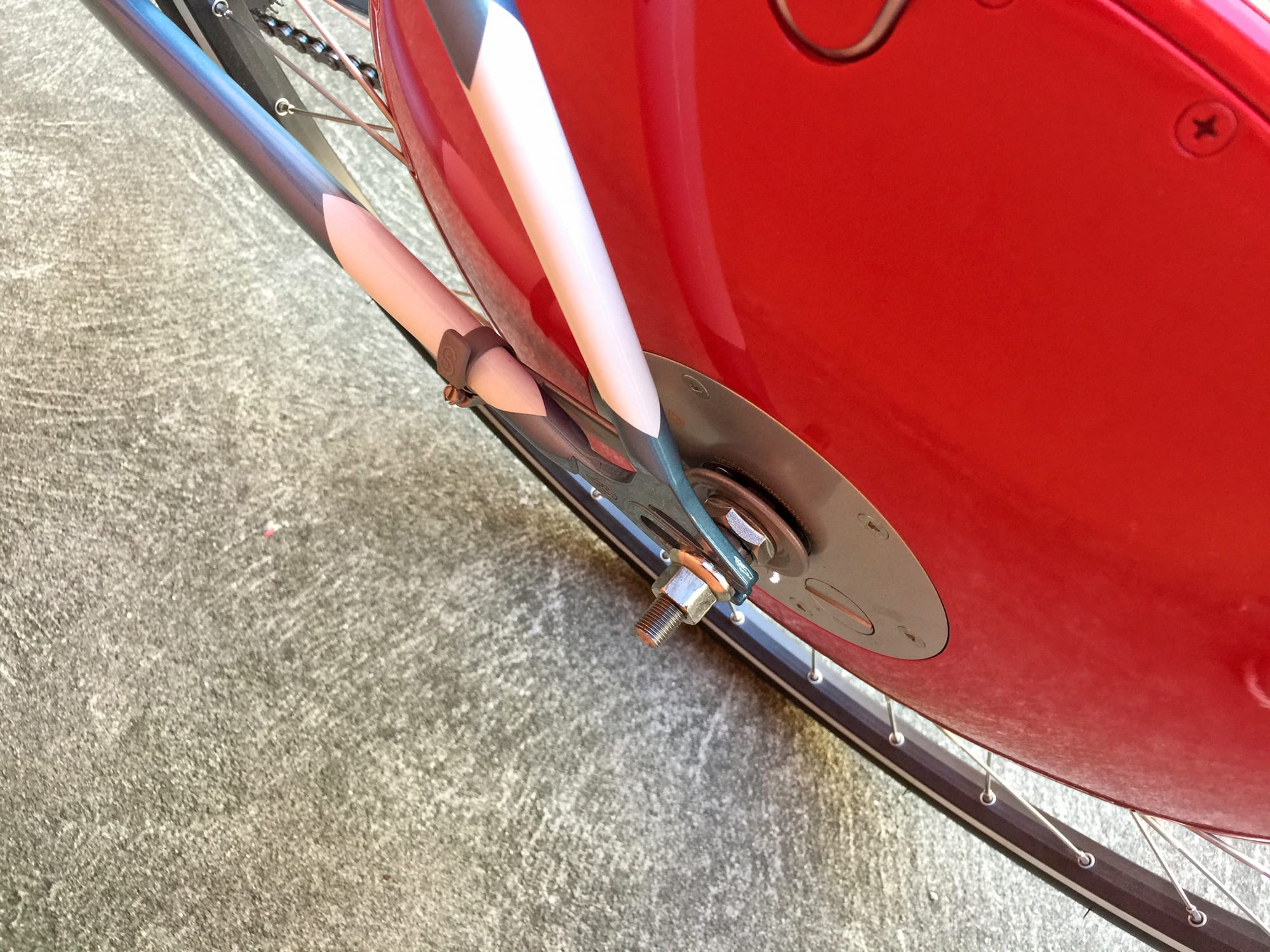
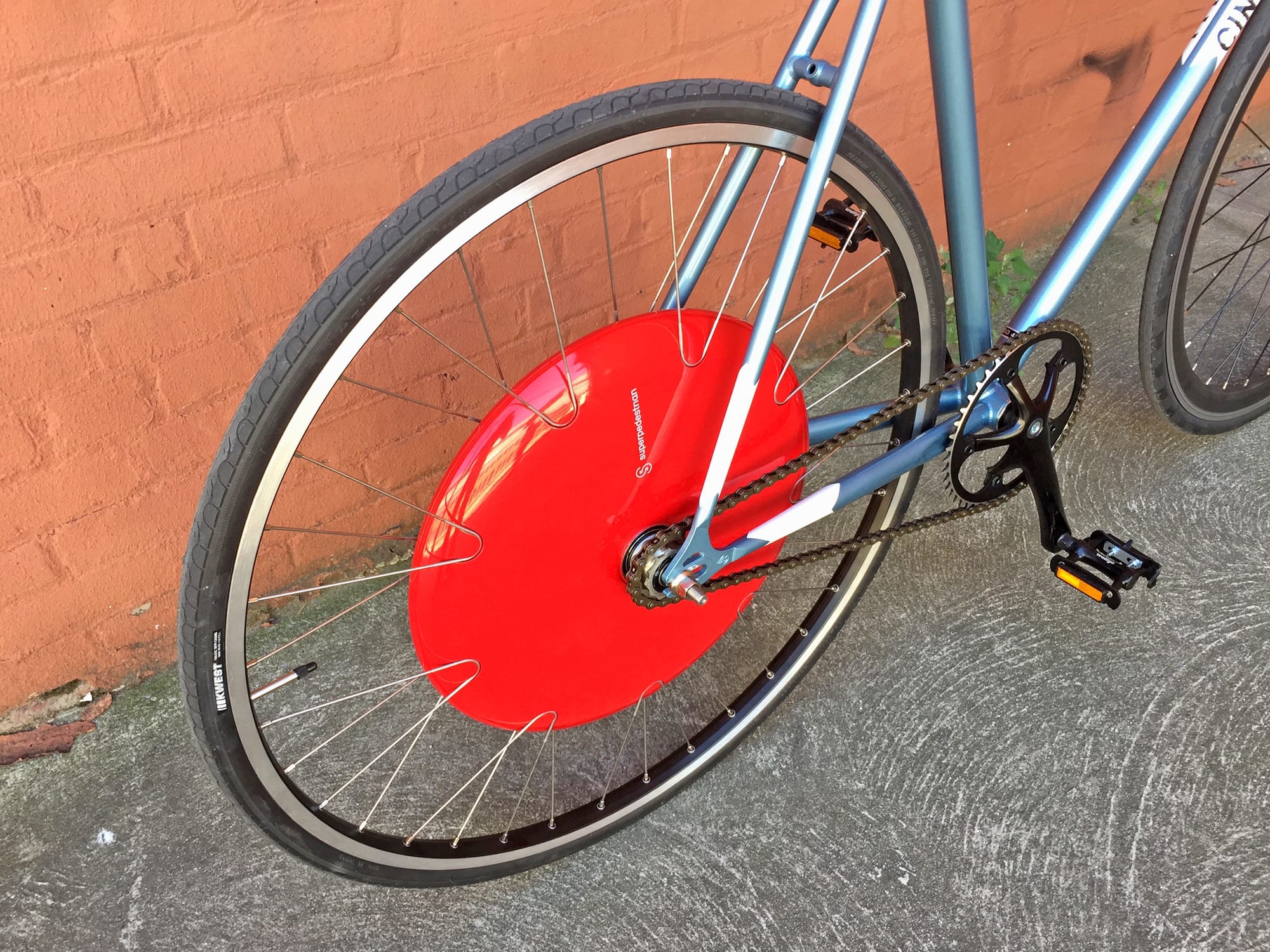
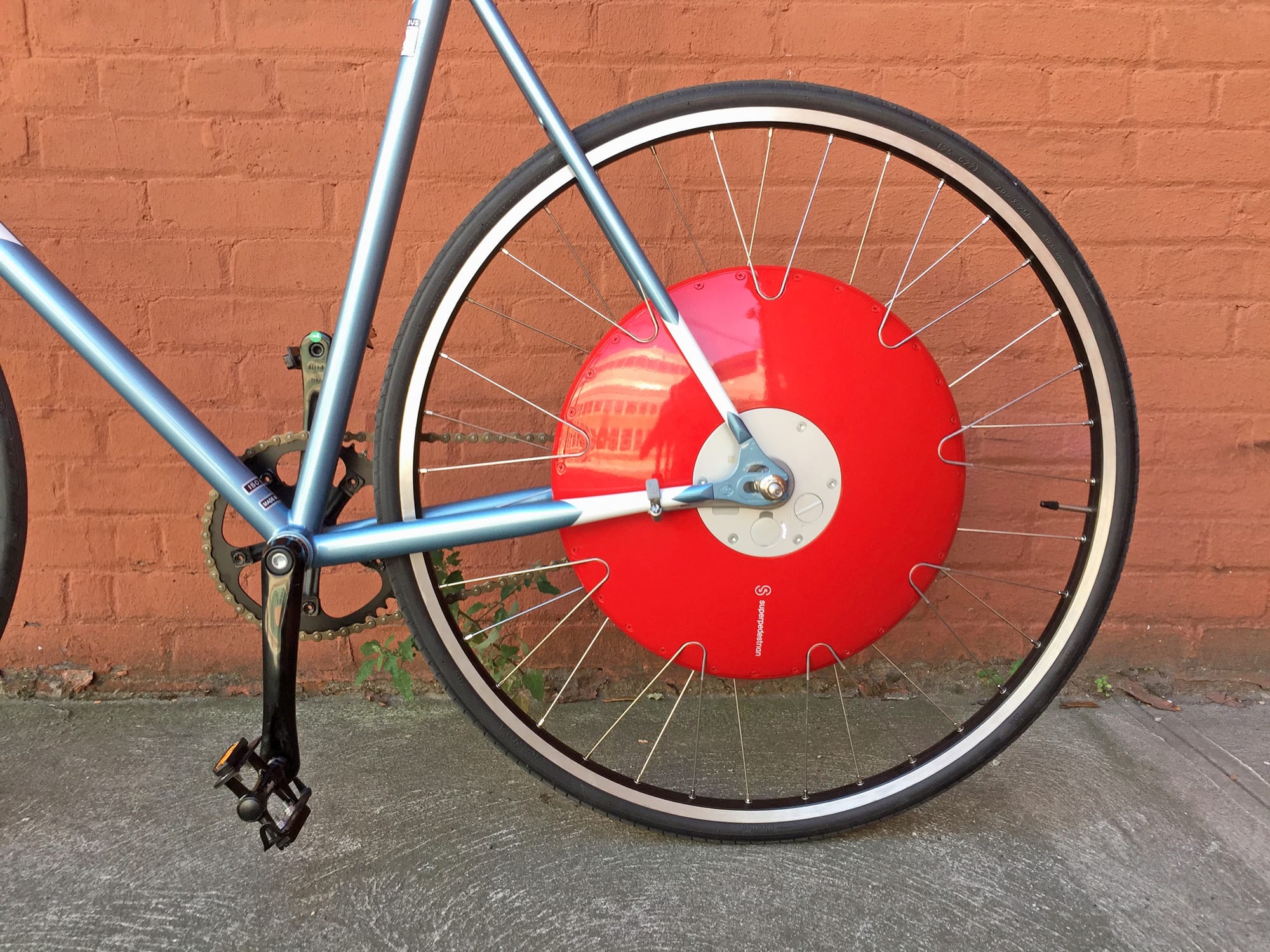
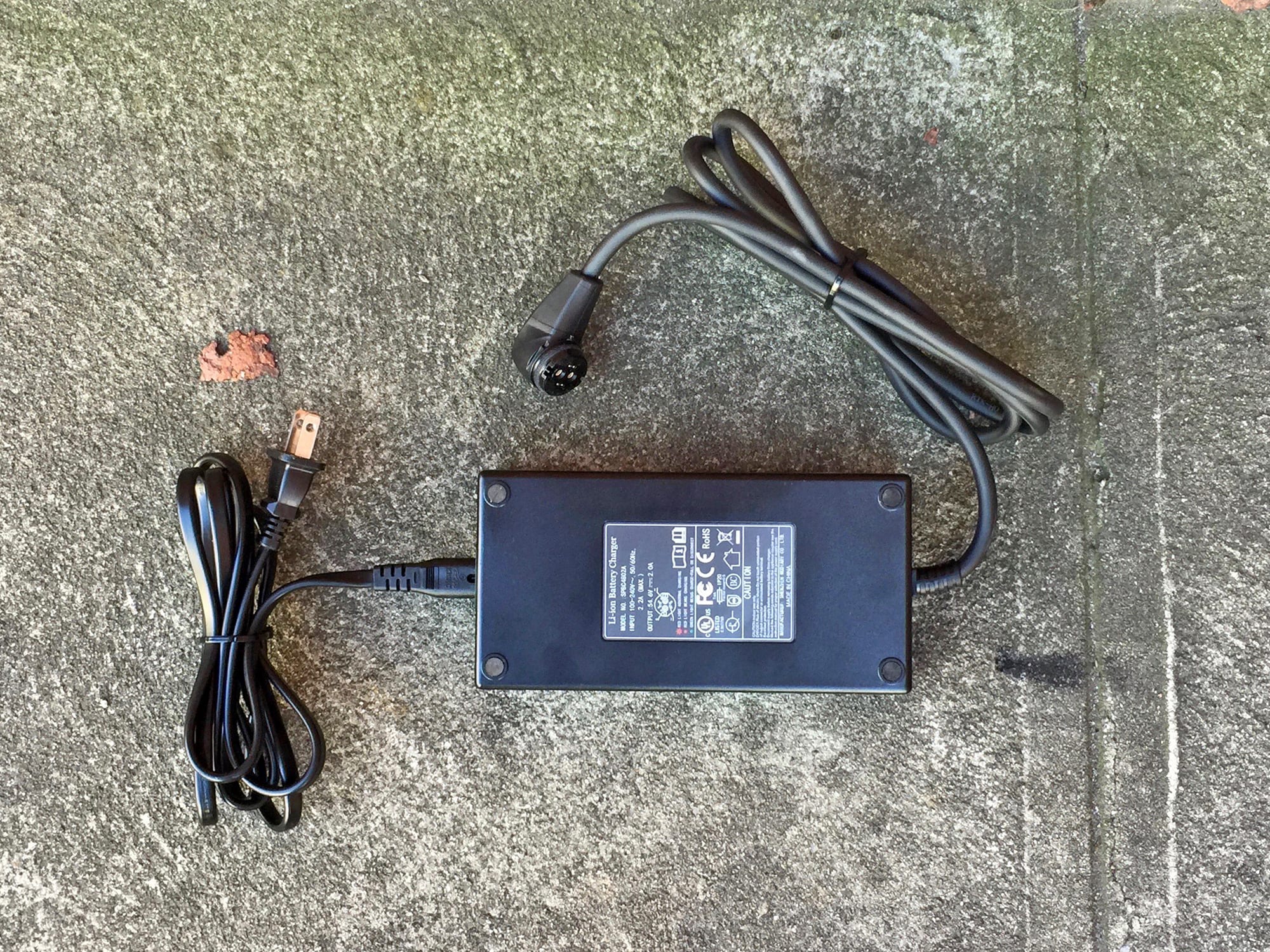
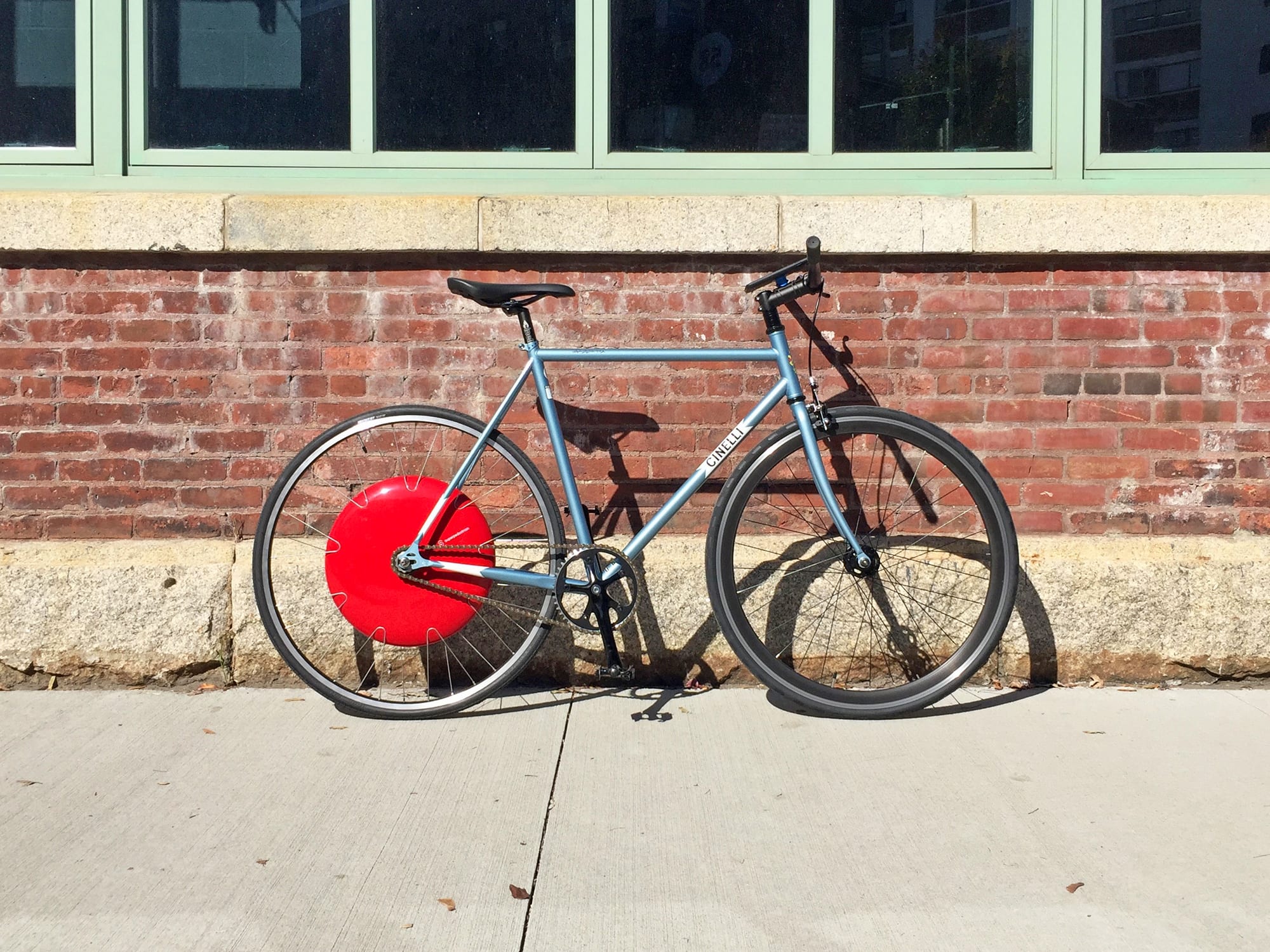



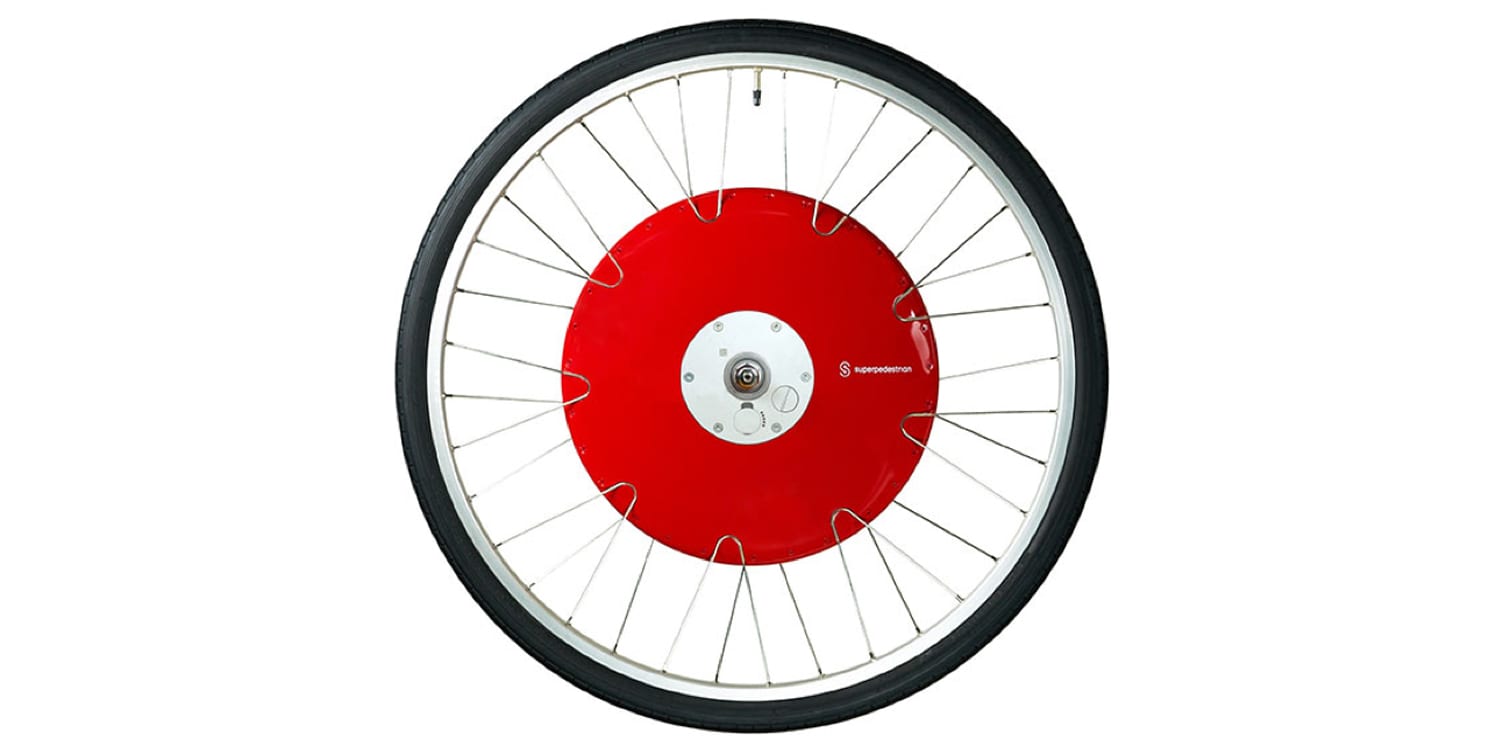
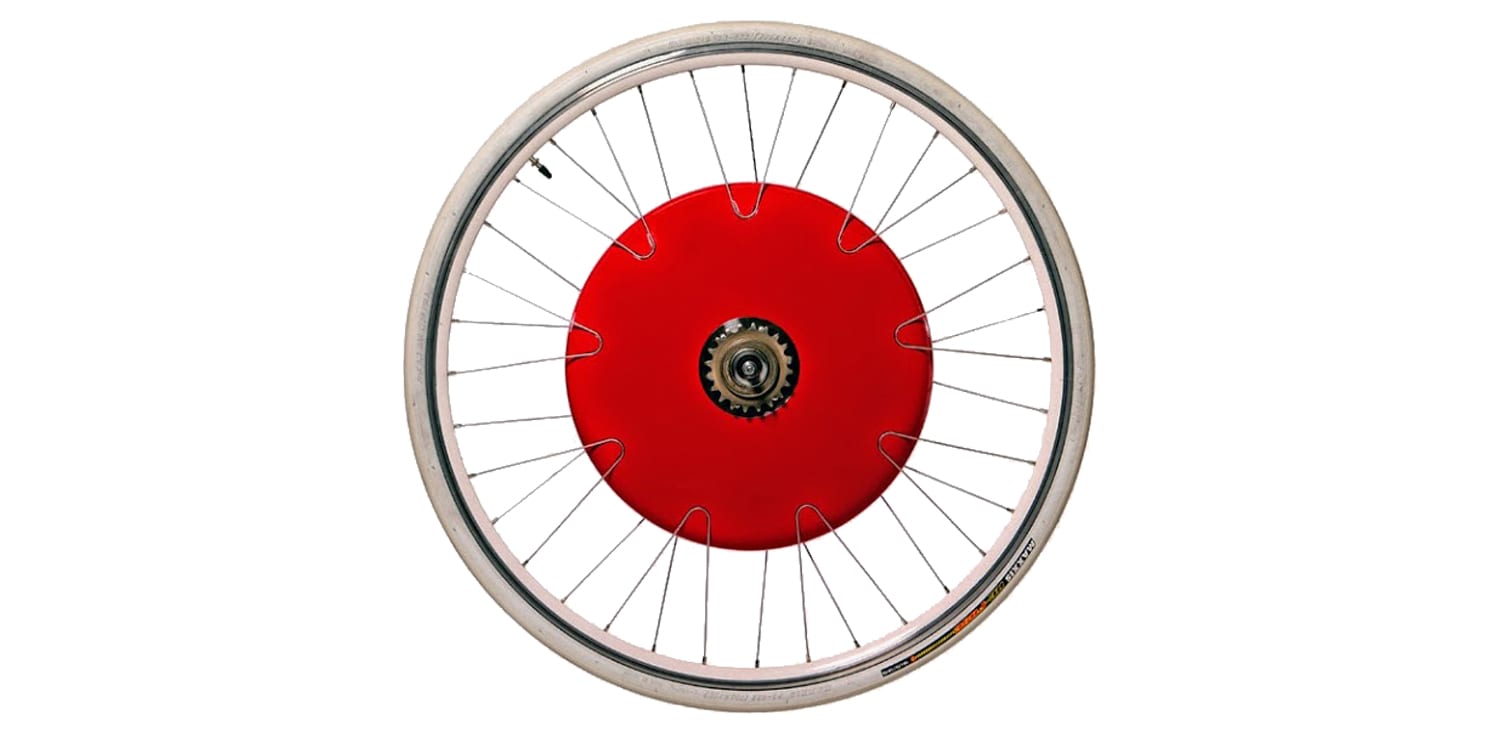


Allan says
I agree with the charging comment. Seeing the design of the new Orbea Gain, perhaps the solution is to have a port that allows a second battery to be used. This would allow for greater range and also allows for a removable battery that could be charged independent of the wheel itself.
I like the idea of the wheel, but I feel it is a bit pricey for what you get and it actually does not work on any of the bikes in my garage. I have a road and cross bike, both with 130 mm spacing and 10 speed, so the Copenhagen wheel doesn’t work with those. My wife has a hybrid with 135 mm spacing, but with disc brakes.
I would consider one for my wife once the disc brake model is released.
Court Rye says
Hi Allan, I’ll have to keep an eye out for the Orbea Gain. It’s neat to see more of the dual-battery options from Bosch and even Faraday has been toying with the idea of an expansion pack for their bikes (to connect under the saddle). The beauty of the CW here is that it’s wireless and simple, but there are definitely some trade-offs with that. It’s pretty good for what it is, but range could be a factor for some people with longer commutes and the whole on-bike charging only situation.
Allan says
Good point Court, the whole wireless nature and simplicity of the CW would be diminished if a 2nd battery option were integrated in that manner.
I have my eye on the Orbea or anything with the Fazua system. I like the Fazua system more because I could use it as my weekend road rider and simply remove the motor and battery. But I can also throw in the motor and battery to make my work commute a bit speedier.
Oh well, getting too far ahead of myself. I have a Crosscurrent S on the way. Hoping to have it within the next 4 weeks. Pretty excited about that!
Tom Reed says
Allen,
I just purchased the Copenhagen Wheel yesterday off the Superpedestrian website and was researching the dropout spacing on my bike and found the Superpedestrian website to be a little confusing in regards to dropout spacing.
If you click on the Copenhagen Wheel link and scroll down to Tech Specs Superpedestrian says this…120 mm (single-speed); 135 mm (single-speed & multi-speed)
If you go to their support page and type in “dropout” you are sent to a page that says the following…
Dropout spacing is the measure of the space between the two supports on which your rear axle sits.
The Copenhagen Wheel comes in two versions – single-speed and multi-speed.
The single-speed version is designed to fit dropouts which are between 120 mm (4.72 inches) and 135 mm (5.31 inches).
The multi-speed version is designed to fit dropouts which are between 130 mm (5.12 inches) and 135 mm (5.31 inches).
Maybe Court can weigh in on this too. I can’t remember if he mentioned the dropout space on the bike he was reviewing in the video but I seem to remember the wheel comes with spacers to adjust the fit between the dropouts.
Tom Reed says
After watching Court’s video review and reading up a little more I decided to get the Copenhagen Wheel.
I bought a Electric Bike Company Newport Beach cruiser for my wife back in August and she has been quite happy with that e-bike so far. She has bad knees and really disliked riding regular bikes for some time. The e-bike converted her from a non bike rider to someone who now enjoys riding a bike again. I have owned a Jamis Coda Sport (non e-bike) for a little over a year and I really enjoy riding it but there are just some days I don’t want to workout so hard (we live in Atlanta and there are hills in the city) and just go on a leisurely ride. I am hoping the Copenhagen Wheel can convert my bike into something of a hybrid bike that I can use for both exercise when I feel like getting a workout in and a more laidback pedelec when I just want to have a nice weekend ride with my wife and don’t want to end up sweating when I get to our destination.
I do have some concerns about adding twenty extra pounds to my already 35 pound bike and also the battery capacity of the Copenhagen Wheel. Most of my rides have been 25 miles or less so I am not too concerned about the battery completely discharging but I would like to not go below 20% capacity on my rides and I think I can make adjustments to my riding style to try and prolong the battery life. I have mixed feelings about the color. It is a little eye catching and I am not sure I want all the attention it might bring but on the other hand my wife works for Coca-Cola and we can always slap the Coca-Cola logo on it and make it look like one of those old Coke signs.
One thing I would like to mention about the Superpedestrian ordering process is that there are two ways to order. The one I used was for me to fill in all the specs of my 2016 Jamis Coda Sport to make sure I was buying the version of the Copenhagen Wheel that would be compatible with my bike. It isn’t too difficult but if that is not your style you can just use the other option which is to purchase the wheel then Superpedestrian will contact you and have an expert walk you through the selection process. Originally I was going to have it shipped to a what Superpedestrian calls a “Hub partner” (a local bike shop) to have them install it and make any chain and derailleur adjustments but the Superpedestrian website did not give me pricing for the shop to do the install so it didn’t make much sense to ship it there not knowing what I could actually be charged for the installation. If I have issues with the installation process I can just bring it up to them at that point.
That being said I am looking forward to the wheel arriving in a week or two and installing it myself.
Allan says
Tom, that is quite interesting. After you get the wheel and use it for a while I’d love to hear your impressions of the product, what you like, don’t like, etc …….
Please post your experience in the forums.
Joel says
I went to the Electric Bike Expo in Costa Mesa California on December 2nd to check out the CW and ride it on their closed course. It worked as advertised, and Will Lendway expertly answered my questions. I had previously checked it out at the local Electric Cyclery and determined that the wheel would be a good match for an aluminum road bike that I have not ridden in a decade. (Two others get regular use). I have no practical purpose for an ebike other than experimenting and satisfying my curiosity; I don’t commute to work or run errands in town, and regular bikes are already sufficiently fast and fun.
I like bikes because they are simple machines that afford me freedom and outdoors exercise. Which is why I have reservations about the CW’s suitability for my personal use. Aside from the usual concerns about weight, durability, and range, there is one other problem which might sound quirky to Superpedestrian designers and their customers: needing a phone to operate it is, for me, a bug, not a feature. What distinguishes the CW is its integrated all-in-one-unit simplicity and the fact it is designed and manufactured in America. I don’t want a Chinese phone stuck to the handlebars. It adds complexity and monitors where I go. I look at a screen enough, I don’t want one on a bike. I know I can stuff it in a pocket, but it’s still a nuisance and a liability, something to get stolen or damaged or run out of battery power. I probably don’t represent a popular opinion, but I would prefer a small, lightweight, purpose-built unit that remains attached to the bike, akin to a cyclometer that displays essential speed and distance numbers, plus battery reserve and current electric-assist mode. It could shift modes with a push button or lever that wouldn’t require looking at it or fiddling with a touch-screen while riding.
Pardon the snark, but an iPhone on a fixie is like the ultimate hipster fashion statement.
Otherwise the CW is fabulous and I would like to actively support Superpedestrian. Their design is a brilliant hybrid of cutting-edge electrical technology with already-perfected human-powered bicycle technology. If it’s not cost-effective for them to engineer their own no-phone alternative, maybe they could adapt or license a pre-existing device from another company.
Court Rye says
Thanks for sharing your experience and feedback about the Copenhagen Wheel Joel, I see your points and agree that a simple control pad (even if optional) could be a welcome addition… the challenge would be in doing so affordably, because I think it would need to incorporate a wireless receiver to connect with the wheel. Part of how Superpedestrian keeps the price low on the CW is by leveraging the power and sophistication of smartphones, which most people already have. Maybe a simpler, cheaper, wired version could eventually be offered with a control pad like you’ve described?
Jayni says
What is the conventional wisdom comparing the Copenhagen Wheel and standard electric bikes for baby-boomer commuters? I have really enjoyed embedding exercise into my life via bicycle commuting. I live in the mountain west, and have an (average) 10 mile commute that includes considerable elevation loss & gain. I’m in decent shape, 60 years old and getting tired. The commute also takes longer than I’d like. The idea of an “assist,” especially on the hills, is really attractive. I’m checking into all options. Any thoughts or advice?
Court Rye says
Hi Jayni! I love the technology that Superpedestrian is building but usually rely on shops to help install kits and tune my bikes. For this reason, I usually opt for purpose-built electric bikes (which Superpedestrian also offers, like a pre-built bike with their wheel). There are definitely trade-offs with their product such as range and the hub motor vs. mid-drives that have grown in popularity. I hear good things about the Electra Townie Go! for people who want comfort, reliability, and a more balanced weight distribution.
Bill F says
I purchased a hollandia ole guippa bike and would like to know which coppenhagen wheel I need?
Court Rye says
Hi Bill! I’m not as familiar with the Hollandia Ole Guippa, and don’t want to misdirect you. This might be a good opportunity to reach out to Superpedestrian directly. Alternatively, you could read the tire size and try to get a measurement so you know which size wheel to use. My guess is that it will say something like 26″ x 1.75″ or maybe 700x48c (which would equate to 28″ diameter). I hope this helps! I believe that this is their direct line if you wish to call (617) 945-1604
michael says
the bike was great, just until today: they installed an unsolicited software update, that leads to the bike slowing you down to 25km/h, which renders it useless as a commuting vehicle and makes it some kind of training device. #theybrickedmybike, #diskbrake
Dave M. says
I’ve put about 50 miles on my Copenhagen wheel and I like it for my particular circumstances. I installed it myself on a 20 year-old, 7-cog cassette Giant Express hybrid. I live on the outskirts of Cincinnati and work in the city itself. I use the bike/wheel for trips to local stores and occasionally to commute the 15 miles to work. There’s an overall drop of 360 feet on this ride and it uses about 50% of the battery charge using Standard mode. I ride the bus home with my bike strapped into a carrier on the front of the bus. Since I ride the bus home I don’t need to worry about charging the battery for the return trip. I typically ride 25-35 miles per week on a road bike for exercise, but didn’t want to arrive at work or the grocery store soaked in sweat. More importantly, I’ve also developed a heart arrhythmia that seems to be triggered by extensive periods of intense exercise so wanted an option to keep riding while not making that situation worse.
What I like about the CW:
What could be improved:
Before I bought the CW I did test ride a number of other electric bikes including an A2B Galvani, a Pedego City Commuter, a Trek Conduit +, a Faraday Cortland S, a Bionix kit and an Elby. I bought the lowest priced electric bike that enabled me to do the rides I wanted to do in a reliable, supported way and preserved the simplicity of a bicycle.
court says
Hi Dave! What a wonderful testimonial, thanks for taking the time to share your pros and cons, explain how the product fits into your lifestyle, and even mention competing products that you tested out. I’m sure that this will help others who are on the market and I gained a lot from reading it too.
Paul Bylenok says
I got my Copenhagen wheel in January, 2017. I first used it with my android tablet until I got a dedicated android smart phone with only Wi-Fi internet service. The wheel worked great until they upgraded the software in June,2018. The new software is poorly designed and a pain in the butt. You now have to log in every day you use it. This requires an internet connection which I have via Wi-Fi when using it from my home. The problem occurs when you want to use it when you don’t have an internet connection. Found this out when I logged in at home, drove to a bike path 50 miles away. When I turned it on, the first thing it wanted was to download my previous trip. It kept cycling on the download part of the software and would not connect to the wheel. I had to drive back home, mad as hell.
There is nothing in their requirements that specifically states you must have an internet connection to operate the wheel. Supposedly, this is now a requirement so if someone steals your bike they cannot operate the wheel. I don’t care about this feature – the wheel stays with me and gets physically locked up with a lock and chain when I leave it for a few minutes. The software startup needs to make the trip download a user option so that it doesn’t hold you hostage to connecting without an internet connection. An internet connection for operation should be a user option. There should also be a default “safe mode home” 24 hour option that will operate the wheel on the last known setting for 24 hours without a functioning phone connection.
Last year, before the software upgrade, this was a 5 star wheel and I was recommending it to everyone. Now I rate it a 3 star and am reluctant to recommend it.
Court says
Paul, thank you so much for reporting on this software update! I’m sure it will help others to consider their own internet connection situation before purchasing. Even though it sounds like a frustrating experience, I’m glad that you took the time to pass it along to us. Thank you!
H.B. says
Hi, I can’t test one of these near where I live. Can anyone tell me how they differ from mid drive electric bikes. I’ve test rode a few ebikes now. My favorite was the Raleigh Tamland. It was amazing, so fast and fun to ride. It felt like being a superhero. I’m trying to decide between buying one of those vs a Copenhagen wheel. The wheel would be cheaper but since I can’t ride one, I’d love any input on making the decision.
Court says
Hi H.B. my own choice would be the Raleigh with Brose mid-drive, it’s way more efficient, balanced, and it responds very naturally and powerfully. Hub motors put weight towards the back of the bike and gearless ones like the Copenhagen Wheel can produce some drag. It also produces some regeneration (power recouperation) but the battery pack is much smaller and built into the wheel where it can vibrate and get hot etc. it’s a much different design concept and I would probably only get it if I already had a bike I loved and wanted to convert it to electric. Those are my thoughts, hope they help you!
Dave in Kansas says
I wish CW offered a 27.5 / 650B wheel. Wondering about the flexibility and power of the CW. If I’m OK with slower acceleration, for example, could I get by with a less expensive single-speed model? I live in an area with a fair amount of hills. Under what circumstances is the CW motor powerful enough to allow propulsion without multiple gears?
Suppose I wanted to mount two chainrings up front with a single speed bike with the CW using a chain tensioner to change manage gear changes. Would the single speed CW allow that? Or, once again using a chain tensioner, would it allow me to use two side-by-side rear cogs?
Court says
Hi Dave! I like your creative solutions… the double chainring is one way, or you could get a Schlumpf or Efneo geared bottom bracket for the front (they have this heal clicker mechanism). The idea of the chain tensioner could work… or could be disappointing and unreliable or just sloppy. In my experience, the DIY hacks are fun, but often feel unsatisfying and make me wish I had just gone for the “real deal” which would be the multi-speed CW in this case. I think this is a unique solution, but if money is an issue, there are many other multi-speed hub motor kits in lots of wheel sizes at a good price with wired-in displays and longer range batteries. I’d probably go for one of them instead because they just felt more satisfying during my tests. The CW is unique, but limited in zippy feel, it has the magnetic drag, you need to use your phone to set it up and adjust it while riding, and there’s no way to charge the phone simultaneously. I thought it was cool, but there’s just more to consider and lots of purpose built ebikes are now in the same price range, so everything looks nice and is wired-in. This is why I haven’t been covering as many kits lately. Hope this helps, here’s the value-priced ebike review section to explore if you’re looking for a bargain.
Rud says
Do realize the battery of this thing is suppose to last 2-4 years meaning after 4 years you can throw away the complete rear wheel, including motor, sensors and wheel itself since the battery is non-replaceable. Why spend that much money when brand new ebikes with replaceable battery are now also available around €900-€1200?
Court says
Good points there, Rud. I agree that it would be nice to have this wheel setup as more repairable. It’s like some cell phones that make it difficult to replace batteries or screens. The mainstream ones have services to do it, but some of the smaller companies don’t, and that limits lifespan.
Christina says
I just wanted to add my personal experience here with a 2016 wheel. I have had the wheel for 3 years and I put 8500 miles on it in that time (mostly commuting in the spring/summer in Northern California). After the first year of ownership the wheel started making some odd noises and I ended up having to send it back to Superpedestrian. They claimed it was a spoke tension issue and after retightnening all of the spokes the problem disappeared. However, that was the point at which I started breaking spokes. After 3 broken spokes and visits to my LBS to get them fixed, the recommendation from Superpedestrian was to replace the rim with the newer version (apparently they knew that the rim design on the 2016 wheel was prone to spoke breakage). With the rim replaced the spoke issue cleared up and I was back to riding. Now, I generally try to avoid riding in wet weather (since the wheel is not very waterproof) but unfortunately got caught by a very late season rainstorm here in California and that was it for the bearings. I took the wheel back to my LBS only to be informed that at this time Superpedestrian doesn’t have a process for replacing the bearings so my wheel is as good as dead (even though by my estimate the battery is still at 90% state of health – which I will admit is pretty darn good for 3 years and ~450 cycles). I was quite surprised to learn that the bearings were not replaceable since they are a known wear item (I can’t count how many bottom bracket, wheel and headset bearings I’ve replaced as part of bike ownership). I plan to continue e-bike commuting because it beats sitting in a car any day of the week, but I don’t think I’ll buy another Superpedestrian wheel. I think they are great as long as you don’t plan to put some serious miles on them. Oh and I agree with the comments about app issues, I eventually turned off the automatic app updates because I got tired of the bugs.
Court says
Thank you so much Christina! While I’m sad to hear about the challenges of your Copenhagen Wheel ownership experience, I am delighted that you shared them here. Great job presenting even handedly and thoroughly. This is an excellent mini-review from real-world use and it’s something I’m just not able to get with my “brand new product” overviews here. Thank you! I hope your next kit or bike is a little bit more reliable and I hope Superpedestrian improves the repairability or durability of their future products.
Tom Opatrny says
Considered this for wife’s bike. Wouldn’t it make more sense to buy a complete electric bike for the same money? This seems way overpriced even if your attached to your older bike. If it was less a thousand bucks??? Innovative and cool but seems overpriced.
Court says
Hi Tom! Yep, in my opinion it’s a much better value and overall experience to get a purpose-built electric bike than this particular kit. Unless you love the design and features of the Copenhagen Wheel, there are other more affordable kits out there that can be used to recycle your existing bike. I’m generally not a big fan of kits to begin with and felt that this one had some big trade-offs and was pretty expensive.
Shaun Sava says
It’s Brilliant! I just started using my CW that I picked up used. I have a 21.7 mile commute with 900ft of climbing, according to Strava. I commute on a Singlespeed, an All City Nature Boy. Until I added the Wheel, it took me all of 1.5hr each way. I don’t have 3 hours to commute so at best I would ride once/week all year long. I’m a fit rider. I log 3k miles/year among a handful of bikes. I started looking at the ebike world in the hopes that I could ride more often in less time. I love the route and the excercise it affords just getting to and from work. I shaved 20 minutes at least each way with the addition of the wheel by riding in ECO mode with full assist, +20mph and consistently finish the ride with 25% battery remaining. I have been commuting by bike at least twice as much as a result. I’ve changed the gear ratio twice, currently at 42/14. May be able to further decrease the time by adding a 12t cog to the rear.
The simplicity alone is brilliant which is also the reason why I love the Singlespeed. The app has been flawless. For the money, I feel that I have a much better ebike overall than a complete ebike. For the right person, highly recommended!!